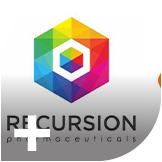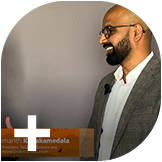Building better cancer drugs: Can AI shift the odds?
Cancer drug development is a notoriously slow and unforgiving process. Even with decades of progress, nine out of ten experimental treatments still fail to make it through clinical trials. The reasons are complex – poor target selection, unexpected toxicity, and patient mismatch, to name but a few – but the result is the same: time lost, money spent, and patients left waiting.
AI is promising to change that. But behind the buzzwords lies a more nuanced shift: one that depends as much on data quality, team culture, and clinical execution as it does on algorithms.
For Najat Khan, chief R&D officer and chief commercial officer at Recursion, the answer starts with a shift in mindset. "We all agree that we have to do a better job of making medicines," she says. "In order to do that, you want to ensure that you're using AI and automation with a clear purpose in mind. It's about making differentiated medicines – and working backwards from there."
But even with cutting-edge models and robotic labs, the road to reinvention is far from frictionless. Beneath the surface lies a deeper set of challenges: data quality, cultural barriers, regulatory hurdles, and the fundamental unpredictability of cancer itself.
Redefining discovery from the ground up
As Khan notes, drug discovery doesn't start with a hypothesis – it starts with scale. In automated labs that resemble precision manufacturing lines more than traditional R&D spaces, millions of experiments run weekly under strictly controlled conditions. Robots handle cell cultures, collect phenotypic data, and generate massive datasets that are fed directly into machine learning models. The goal isn't just speed –it's consistency, reproducibility, and the ability to compare results longitudinally over time.
"We only understand about 10% to 15% of biology, and a lot of the data is not collected in a generalisable, reproducible manner," says Khan.
"The way you cover gaps is to have holistic data sets, not just bespoke snapshots, and that can only be done in an automated way."
But as Khan notes, it's not just about finding interesting biology – it's about finding biology that matters, what she calls "the unobvious edge". Khan points to an example in oncology: CDK12, a target long known to play a role in DNA damage response, but difficult to drug due to its similarity to CDK13. Using AI-generated biological maps, Recursion's team identified a previously overlooked target – RBM39, involved in splicing fidelity. Within 18 months, they'd designed a compound targeting it and advanced the programme into early clinical development. That's less than half the time such a process would typically take.
The approach is deliberately end-driven. By anchoring drug discovery around the patient outcome – whether that's a first-in-class target or a therapy for an unmet need – AI is not just changing how drugs are developed; it's forcing a re-evaluation of where drug discovery begins.
Predict, validate, repeat – closing the loop between data and patients
The promise of AI in oncology doesn't stop at identifying targets. It extends into how we validate them, match them to patients, and design the trials to test them. Increasingly, the most forward-thinking approaches are built around an iterative loop between data generation and model refinement – between what the algorithm predicts and what the lab or clinic confirms.
This loop enables faster, smarter decisions. "AI lets you continuously learn from your data – adjusting your models, refining your hypotheses, and narrowing your uncertainty with every cycle," says Khan. It's a shift from static experiments to dynamic learning systems, where insights evolve in real-time.
AI's impact on the clinical side of drug development may be even more immediate. According to Kerri Cali, senior director and head of clinical operations at Recursion, predictive modelling is already improving how trials are planned and executed. Algorithms can now forecast enrolment rates, identify optimal trial sites, and flag underrepresented patient populations – improving both efficiency and equity.
"Patient heterogeneity is a well-known phenomenon," says Hemanth Kanakamedala, Recursion's vice president of decision science and real-world evidence. "The ability to quantify this heterogeneity has been the biggest challenge for our industry. Given certain genomic and clinical features of a patient, what is the probability that they'd respond to an experimental therapy, or a combination therapy? That is the key question."
In this context, AI is being used not only to improve site selection and streamline recruitment logistics, but also to simulate treatment outcomes in silico, before any patient is enrolled.
"This is where real-world human genomics data can be incredibly valuable," says Kanakamedala.
Kanakamedala adds. "The ability to model the genomic attributes of patients with various tumours and their outcomes allows us to build a robust understanding of the biology of the patients. We're able to simulate whether modulating a certain target would result in a high magnitude of effect."
Still, while the promise of AI in oncology is exciting, the technical limitations are real. "One of the biggest gaps is between AI's potential to accelerate patient matching and optimise trial design versus the fragmented reality of clinical data systems. AI tools excel at pattern recognition when fed clean, structured datasets," Cali explains, "but clinical reality involves unstructured records – siloed across EMRs, labs, imaging systems, and genomic platforms that don't speak to each other, alongside inconsistent biomarker reporting, and lack of harmonized data formats across the healthcare landscape."
The positive news, as Cali explains, is that efforts are advancing to close these gaps, with emerging AI applications showing promise in targeted use cases, addressing the inherent complexity of real-world datasets.
"While progress is being made in wider strides and at an accelerated pace, the reality is that, until we solve these fundamental data infrastructure problems more holistically across the industry and create truly interoperable clinical data ecosystems, AI will continue making incremental improvements, rather than delivering the transformational acceleration needed to bring effective treatments to patients faster."
Culture change or code change? The hidden barrier to AI success
For all the talk of algorithms and automation, the biggest challenge in scaling AI across cancer drug development may not be technical, but cultural. The disjunction between the work of data scientists and domain experts is well documented: AI teams have traditionally worked in silos, while medicinal chemists rely on instinct honed over decades. But for AI to deliver meaningful change in the oncology space, Khan stresses the need to foster an appreciation of each team's skills.
"At Recursion, we talk about building 'bilingual' teams," says Khan.
"People whose native language might be chemistry or computer science – but who understand enough of the other side to collaborate effectively."
She points to Boltz-2, a new biomolecular foundation model co-developed with MIT, as a key example of how this bilingual approach works in practice. Unlike earlier tools focused only on structure prediction, Khan explains that Boltz-2 adds a critical dimension: binding affinity. For medicinal chemists, that's a game-changer, adding one of the most critical elements of drug discovery and development to their virtual toolkit. And because the model includes a "controllability" feature, scientists can fine-tune parameters – guiding the model with their own knowledge of what makes a molecule viable.
That sense of co-ownership is central to shifting mindsets. "Instead of us versus them," Khan says. "It's about supercharging what we can do today to give it the best chance of success." But she's also clear-eyed about the operational realities. Creating usable datasets, shaping regulatory conversations, and scaling infrastructure all take time. "I would love to have a corpus of data that exists like PDB [Protein Data Bank], which helped, but there's not a lot of those clean, reproducible data sets that exist in the public domain. But it takes time to build the base before you can actually do the analysis, the insights, and the outcome," she explains.
For AI to truly accelerate oncology drug development, the entire ecosystem needs to evolve in parallel: not just algorithms and datasets, but people, processes, and regulatory frameworks. As more leaders across pharma begin to focus on usability and trust, the field may finally start to move beyond proof-of-concept – and toward broader adoption.
Still, for Khan, the reward is worth the complexity. As AI begins to reveal patterns in resistance, predict patient outcomes, and speed up cycle times, oncology drug development is inching toward something long overdue: a process that works not just faster, but smarter. Citing one of her favourite quotes from former US President Teddy Roosevelt, she concludes with a call to the industry: "There's no option for us not to try."
About Recursion
Recursion (NASDAQ: RXRX) is a clinical stage TechBio company leading the space by decoding biology to radically improve lives. Enabling its mission is the Recursion OS, a platform built across diverse technologies that continuously generate one of the world’s largest proprietary biological and chemical datasets. Recursion leverages sophisticated machine-learning algorithms to distil from its dataset a collection of trillions of searchable relationships across biology and chemistry unconstrained by human bias. By commanding massive experimental scale – up to millions of wet lab experiments weekly – and massive computational scale – owning and operating one of the most powerful supercomputers in the world, Recursion is uniting technology, biology and chemistry to advance the future of medicine. Recursion is headquartered in Salt Lake City and has offices in Toronto, Montréal, New York, London, Oxford area, and the San Francisco Bay area.
Learn more at www.Recursion.com, or connect on X (formerly Twitter) and LinkedIn.
About the interviewees
Najat Khan, PhD, chief R&D officer and chief commercial officer at Recursion
Najat Khan, PhD, is a Big Pharma-turned-TechBio C-suite leader at the forefront of the AI drug discovery and development revolution. She brings a unique blend of scientific, tech and business acumen to her role leading R&D and commercial efforts at Recursion. Prior to Recursion she was chief data science officer and global head of strategy & portfolio organisation for innovative medicine R&D at Johnson & Johnson – an end-to-end leadership role combining biological, chemical and medical science, data science, and business to drive impact for patients.
Khan is the founder and co-chair of the Data Science in Industry Roundtable (DISRUPT) – a cross industry forum dedicated to driving impact through data science – and serves as a board member for Alliance for Artificial Intelligence in Healthcare and as a Steering Committee member of CancerX, a public-private partnership that aims to accelerate innovation in the fight against cancer as a part of the White House’s Cancer Moonshot initiative.
Hemanth Kanakamedala, VP decision science and real world evidence at Recursion
Hemanth Kanakamedala is vice president of decision science and real-world evidence at Recursion. In this role, he oversees the integration of real-world data and other secondary data sources – including real-world human genomics, EHRs, administrative claims, and historical trials – into Recursion's late-stage discovery and clinical development portfolio.
Prior to Recursion, Kanakamedala led the integration of real-world evidence across early and late stage development within the R&D division of Johnson & Johnson Innovative Medicine. Where he and his team applied pharmacoepidemiology and causal inference methods to support decisions on pipeline advancement, regulatory approval, and reimbursement.
Kanakamedala has over 14 years of experience in drug development and commercialisation. He holds a degree in mathematics and statistics from the University of Massachusetts, Amherst.
Kerri Cali, senior director/head of clinical operations at Recursion
With over 15 years of clinical trial operations experience, Kerri Cali is a seasoned leader adept at navigating the complexities of drug development across therapeutic areas, from early to late-phase studies. Her extensive journey has taken her through impactful roles at trial sites, contract research organisations, and biotech companies, providing a truly holistic and comprehensive understanding of the clinical trial landscape.
Her dedication to this field isn't merely professional; it's deeply personal. Having witnessed firsthand the profound impact diseases like cancer have had on family and friends, she is committed to the mission of accelerating medical advancements and ensuring that clinical trials fulfil their potential to improve and transform patients' lives.
Supercharge your pharma insights: Sign up to pharmaphorum's newsletter for daily updates, weekly roundups, and in-depth analysis across all industry sectors.
Want to go deeper?
Continue your journey with these related reads from across pharmaphorum
Click on either of the images below for more articles from this edition of Deep Dive: Oncology 2025














